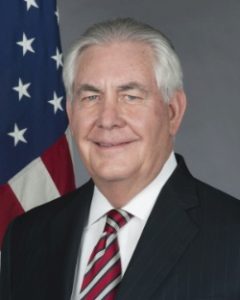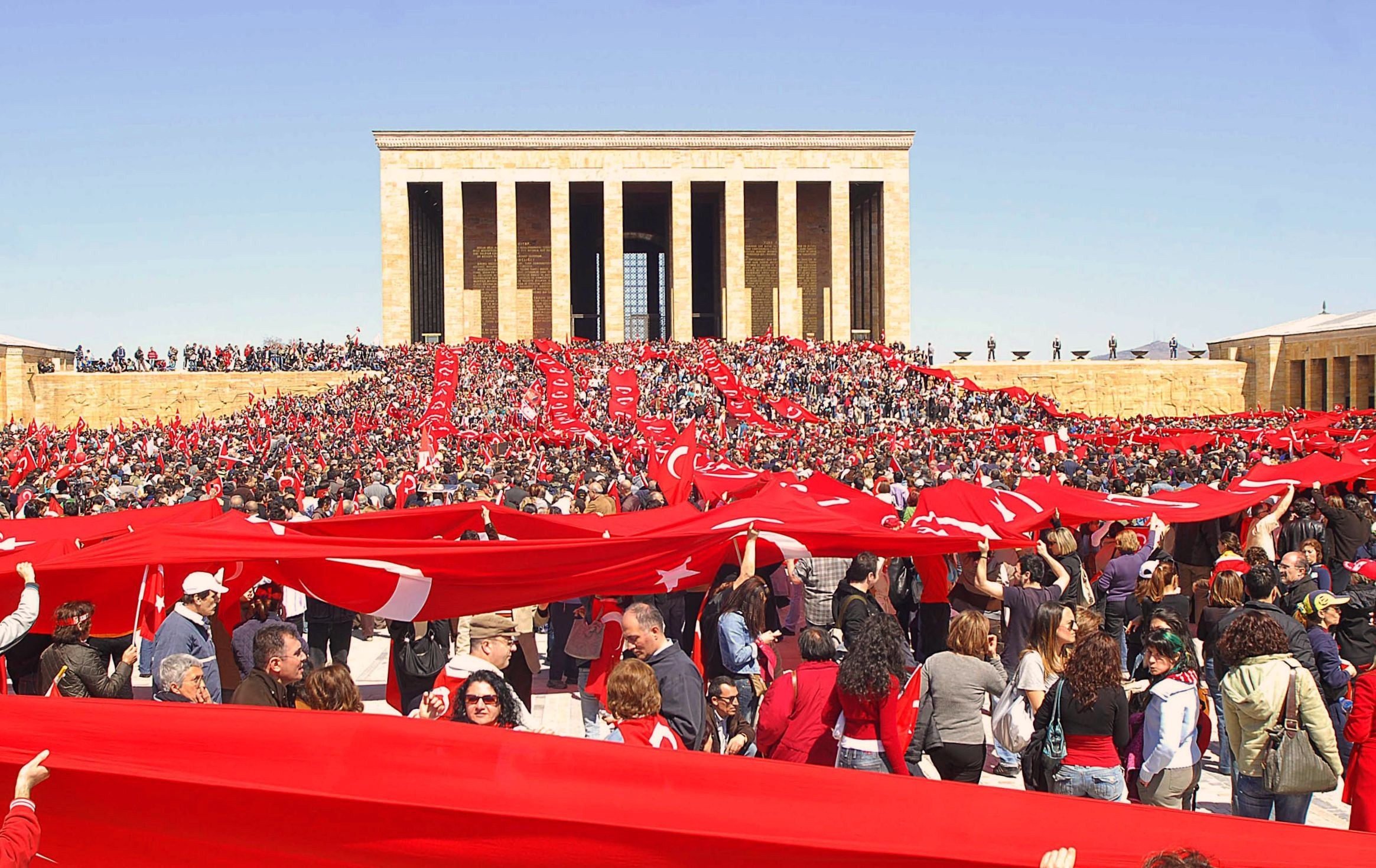 Well isn’t this interesting? From Diplopundit last Friday comes a post with this title: Tillerson Meets Erdoğan in Ankara With Turkish Foreign Minister as Interpreter. The post is a series of tweets from all kinds of media folks, which include some of these gems:
Well isn’t this interesting? From Diplopundit last Friday comes a post with this title: Tillerson Meets Erdoğan in Ankara With Turkish Foreign Minister as Interpreter. The post is a series of tweets from all kinds of media folks, which include some of these gems:
Nicholas Wadhams of Bloomberg News:
Secretary of State Tillerson is currently meeting with Turkey’s President Recep Tayyip Erdogan. He is the lone US representative and Turkey’s foreign minister is translating.
Rajib Soylu, Washington correspondent for Daily Sabah:
This is the second Erdoğan – Tillerson meeting where all Turkish, American officials, and even the translators excluded.
Turkish FM functions as a translator.
Ihlan Tanir of Washington Hatti US:
Im trying to understand — I never expected Pres Erdogan and Sec Tillerson to have a press conference but they did not even read statements following 200 minutes of a meeting?
Let’s pause here for a moment to let that last one sink in.
It’s one thing if the Turkish Foreign Minister brings Erdogan over to Tillerson at a meet-and-greet and translates some friendly “let me show you pictures of my grandkids” chit-chat between the two. But that’s not what this was. This was a lengthy, official, and private meeting that lasted over three hours between some very high level folks at a time of rather significant tension between the two countries.
You don’t have meetings like this without your own translator. You just don’t. The typical process is that both sides have interpreters. Official A speaks, the interpreter for Official B tells Official B what was said, and the interpreter for Official A says some version of “Yes, that’s correct” to verify the interpretation. Then it all works in reverse when Official B replies. With difficult issues under discussion, the last thing either side wants is confusion about what each side is saying.
Excluding your own interpreter is so far outside of normal protocols it is unreal, and begs the ever-green question about most everything since 1/20/2017: idiot or crook?
As Diplopundit noted in his/her own tweet, someone else was missing from this meeting — an official note taker:
Saving money on translators*, too? And the foreign FM will just share his notes of the T-E discussion with the State Dept. Or EUR can use their Magic 8 ball.  It knows everything and always willing to share.
It knows everything and always willing to share.
(* Diplopundit later corrected this to “interpreters”, as a slip of the fingers since “translators” are more precisely those who deal with written documents while “interpreters” handle verbal communications.)
“EUR” in that last tweet is the State Department’s Office of European Affairs, where long ago I was an intern. I can only imagine the reaction in Foggy Bottom was when word of Tillerson’s meeting with Erdogan reached them. It likely involved multiple variations on “He did WHAT?!?!?” with various . . . ahem . . . flavoring words for emphasis added. As former State Department spokesperson and retired Rear Admiral John Kirby told CNN:
“If the meeting is not conducted in English, it is foolhardy in the extreme not to have at his side a State Department translator, who can ensure that Mr. Tillerson’s points are delivered accurately and with the proper emphasis,” said former State Department spokesman and CNN diplomatic and military analyst John Kirby.
“That Mr. Tillerson eschewed this sort of support in what he knew would be a tense and critical meeting with President Erdogan smacks of either poor staff work or dangerous naïveté on his part,” Kirby added.
And that’s what Kirby said about this in public. I’ll leave it to your imagination what he and other current and former State and Defense Department folks said to each other about it in private. Hold onto this for a moment, because we’ll come back to it in a bit.
Eventually, Tillerson and his Turkish counterpart Mevlut Cavusoglu did in fact have a press availability, which the State Department has up on their website. In the statements issued by both, as well as their answers to questions from the reporters, they talked about all manner of increasingly tense topics, from the Kurds to what’s happening in Syria to the failed coup and the Turkish demands for Fethullah Gulen to be extradited back to Turkey, and more.
Two items stood out here. First, there’s this from Tillerson about midway through:
SECRETARY TILLERSON: Well, with respect to how we’re going forward – and that’s what all of the discussion here was about, recognizing where we find ourselves. And I think as the foreign minister indicated, we find ourselves at a bit of a crisis point in the relationship. And we could go back and revisit how we got here, but we don’t think that’s useful. We’ve decided and President Erdogan decided last night we needed to talk about how do we go forward. The relationship is too important, it’s too valuable to NATO and our NATO allies, it’s too valuable to the American people, it’s too valuable to the Turkish people for us to not do anything other than concentrate on how are we going forward.
And out of the meetings last night – and much of our staff was up through the night to memorialize how we’re going to go about this, and we’ll share a little bit of that in the joint statement. We’re going to reserve a lot of the details because there’s a lot of work yet to be done, and we – and our working teams need to be allowed to do that work in a very open, frank, honest way with one another so that we can chart the way forward together.
I’ll bet the staff was up through the night. If no staff were allowed in the three hour meeting, then the only one who can tell them what was said, what kind of emphasis it was given, what threats were made, what promises were made, and what kind of nuance there was to each of the exchanges was Tillerson. No offense to the Secretary, but that makes the work of the staff very very difficult. To begin with, they had to interview Tillerson just to get all the information about the meeting (and pray he didn’t leave anything out), before they could even think about “how we’re going forward.”
But the larger item that stood out to me came in the very last pair of question asked, reprinted in full below but with emphasis added:
QUESTION:[ed: to Tillerson] Did you warn Turkey that they could be subject to sanctions under CAATSA legislation if they go ahead with the purchase of the S-400 system? [ed: CAATSA is the Russian sanctions legislation that Congress passed but Trump refuses to implement with any teeth.]
And for you, Mr. Foreign Minister, would the threat of U.S. sanctions stop you from going ahead with the purchase of the S-400 system? And if you do buy the system, do you still want to remain in NATO if you’re obtaining the weapons from Russia?
SECRETARY TILLERSON: We did discuss the impact of the CAATSA law that was passed by the Congress last summer that deals with purchases of Russian military equipment. I discussed it last night with President Erdogan; we had further discussions this morning about it. And indeed, it’s in the first group of issues that the foreign minister is referring to. We need to put a group of experts together, and we’ll look at the circumstances around that, as we’ve done with governments all over the world, not just Turkey, because the intent of that legislation was not to harm our friends and allies. But it is directed at Russia for its interference in our elections. So we’ve been advising countries around the world as to what the impact on their relationship and purchases that they might be considering with Russia, and many have reconsidered those and have decided to not proceed with those discussions.
Every case is individual on its own. We want to consult with Turkey and at least ensure they understand what might be at risk in this particular transaction. We don’t have all the details yet, so I can’t give you any kind of a conclusion, but it’ll be given very careful scrutiny, obviously, and we’ll fully comply with the law. And we are – we are now implementing CAATSA and fully applying it around the world.
FOREIGN MINISTER CAVUSOGLU: Thank you very much. First and foremost, I need to underline that I am against the terminology that you use. You used the threat terminology. That is not a correct terminology to be used because it is true for all countries and states. We never use the language of threat and we deny if it is used against us, because this is not correct.
But as Rex has also indicated, this was not something that we talked just yesterday and today. When we met in Vancouver, we talked about this, and from time to time when we have phone conversations, we talk about such issues. This was again brought to the agenda in one of those talks. Of course, there is a law that was enacted by the United States Congress, and they explained this legislation to us. But on the other hand, this is our national security, and it’s important for our national security. I have emergency need of an air defense system. We want to purchase this from our allies, but this does not exist. So even when we are purchasing small-scale arms, the Congress or some other European parliaments, we have – we have and we had difficulty in purchasing these because of these excuses, and I have an emergency need. And the Russian Federation came up with attractive proposals for us. We also talked to other countries, not just with Russia, but we talked about this issue of emergency need with many countries and we had bilateral talks.
Also, in the mid-term, we talked about joint production and technology transfer. We focused on this because this is important for Turkey. And lastly, during the Paris visit of our president – with Eurosam – this is a French-Italian partnership – there was a pre-agreement signed, a memorandum of understanding signed with these groups. So we do not have any problems with our allies. Why should we not meet this requirement with NATO? But, of course, when it is not met within this platform, we need to look for alternative resources. Otherwise, some batteries – some Patriot were withdrawn from our frontier. Some European allies withdrew them. We have (inaudible) of the Italians and Patriots of Spain, and we do not have any other air defense. And we need to meet this requirement as soon as possible. And when we talked to Russia, this was actually an agreement that we reached before the legislation in Congress was enacted. And the remaining part was about the details of loans, et cetera.
Of course, we talked about all of these, and we will take into consideration this – within this working group the commission, but all of us need to understand each other and respect each other. Thank you very much.
In Cavusoglu’s answer, he is pushing back hard on attempts to isolate Turkey. He’s being polite about it, but the very public message is clear: “You know, the Russians seem very interested in making a deal with us, and if you persist in trying to pressure us and don’t back us with the Kurds and cause problems in Syria and don’t return that coup-instigating terrorist you are harboring, the Russians seem pretty clearly ready to help us out where you will not.”
Which makes Tillerson’s earlier comment above sound like he got that message loud and clear. To repeat: “The relationship is too important, it’s too valuable to NATO and our NATO allies, it’s too valuable to the American people, it’s too valuable to the Turkish people for us to not do anything other than concentrate on how are we going forward.”
But there were also some private messages being sent here, too.
Let’s go back to that no-staff-allowed element of the meeting once more. In general, it is in the interests of both parties to a conversation like that to have interpreters and notetakers present, so that in the public discussions that follow (like the one above), everyone agrees on the basic facts of what was said and you don’t getting into a “but you said . . .” and “no I didn’t” back-and-forth. For the meeting to exclude such staffers means that there is something else that overrides this interest.
In this case, the Turks had to have demanded that Tillerson not bring anyone with him to this meeting. There’s no way he would have told his staff “I got this – you take a break while I talk with Erdogan” on his own. The question is why, and all the possible answers I can come up after reading the Turkish Foreign Minister’s reply to that last question involve Vladimir Putin wanting Erdogan to pass on some kind of message to Trump — a message that he did not wish to be delivered within earshot of interpreters and notetakers.
It reminds me very much of that May 2017 Oval Office meeting that Trump had with Russian Foreign Minister Sergey Lavrov and outgoing Ambassador to the US Sergey Kislyak. That was the meeting where we later learned that Trump revealed Israeli intelligence to the Russians about their source inside ISIS and told them that he just fired “that nut job” James Comey which took the pressure off of him because of Russia.
Oh, and the US press were kept out of that meeting as well, with the only reports of it coming after the Russians told us about it. As Politico’s Susan Glasser noted about that Oval Office meeting, it came at the specific request of Putin:
The chummy White House visit—photos of the president yukking it up with Lavrov and Russian Ambassador to the United States Sergey Kislyak were released by the Russian Foreign Ministry since no U.S. press was allowed to cover the visit—had been one of Putin’s asks in his recent phone call with Trump, and indeed the White House acknowledged this to me later Wednesday. “He chose to receive him because Putin asked him to,” a White House spokesman said of Trump’s Lavrov meeting. “Putin did specifically ask on the call when they last talked.”
Kind of makes me wonder if the reason Tillerson left the interpreter back at the embassy is because Putin asked him to in a phone call last Monday. From CNN:
Washington (CNN) President Donald Trump spoke Monday with his Russian counterpart Vladimir Putin to express condolences for a weekend plane crash outside Moscow, according to a US official.
The phone call came amid ongoing Washington-Moscow tensions over policy in the Middle East and Russia’s attempts to meddling in US elections.
Russian news agencies reported the phone call also included discussion of the situation in Israel. . . .
Again we’re hearing about this via Russian news agencies? I’m sensing a pattern here . . .




![[Photo: Emily Morter via Unsplash]](https://www.emptywheel.net/wp-content/uploads/2017/08/Question_EmilyMorter-Unsplash.jpg)







 It knows everything and always willing to share.
It knows everything and always willing to share.